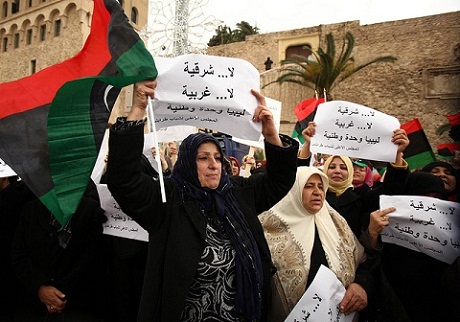
Opponents and supporters of federalism clashed with knives, guns and rocks in the eastern Libyan city of Benghazi on Friday 16 March. The violence erupted after hundreds of people demonstrated in favor a political project aimed at dividing Libya into three autonomous regions.
That demonstration was one of several rallies that started after a conference of tribal and political leaders in Benghazi. The conference unilaterally declared Cyrenaica (Berqa in Arabic) an autonomous polity, polarizing public opinion and prompting fears that the country might split up. These developments seem to intensify the struggle for the future of Libyan governance.
Under these conditions, does federalism have a future?
If we look at the current situation federalism seems the only viable option for stability in Libya. Federalism is seen as the best way to guarantee minority rights, to account for the diversity of Libya’s religions and tribes and to manage the country’s abundant oil resources.
Federalism is not new to Libya. Under the monarchy of Idris Senussi, the country was a federal union from 1951 to 1963, consisting of three administrative regions – Cyrenaica in the east, Tripolitania in the west and Fezzan in the south. This past experience encouraged the pro-federalists in eastern Libya to call for autonomy. They propose to divide Libya into the same three regions as had prevailed during the loose federation before Col. Muammar el-Qaddafi.
Federalists expect that a decentralized governance structure would prevent the marginalization of cities and towns in eastern and southern Libya and the re-emergence of a dictatorship.
Anti-federalists on the other hand warn that the unilateral declaration of Cyrenaican autonomy will endanger the unity of the country. They accuse the autonomists of having a separatist agenda which is supported by external powers. The interim authorities go even further and equate the call for federalism with sedition. Most significant, however, might be Tripoli’s fear of losing control over the oil resources in eastern Libya.
The federalists have reacted to such fears with reassurances that the management of natural resources would still fall under the competence of the central government. Cyrenaica, and its capital, Benghazi, would get is its own legislature, budget, police and courts, but not control over the region’s oil.
Calls for preventing further polarization between federalists and their opponents are getting louder. Confrontation won’t serve Libyan unity and both sides would lose, or so the argument goes. Recently, the Libyan government announced a plan outlining the next steps for decentralizing governance, in order to appease both sides.
That announcement, however, came too late. It couldn’t calm the situation, least of all after the autonomy of Cyrenaica had been declared unilaterally. The discussion about federalism in Libya is increasingly taking the form of a war of words between the two sides, thereby reducing the prospects for federalism.
These prospects can only rise if the Libyan government and the National Transitional Council (NTC) consider carefully what to do next. By implementing its plans for decentralization, giving local councils more power, and reconsidering the allocation of seats in the National Assembly, trust can be rebuilt between the polarized parties. The measures should be framed by constructive dialogue and based around a consensus among Libya’s people.
Plans for federalism should also take into account the changed situation with regard to the number of districts rather than adopt an outdated, sixty-year-old model. In contrast to 1951, Libya consists of 22 administrative districts today.
Libya does not stand alone in its struggle for a new form of governance. There are many countries which experienced their own way of federalism. Libya should benefit from these precious experiences through information exchanges – be it by learning from “newcomers” like Iraq, which has one of the weakest forms of federalism forms in the world, or from long-consolidated “old stagers” like Switzerland.
For further information on the topic, see our keywords Libya and federalism.

